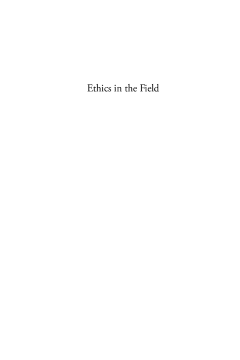
Additional Information
Book Details
Abstract
In recent years ever-increasing concerns about ethical dimensions of fieldwork practice have forced anthropologists and other social scientists to radically reconsider the nature, process, and outcomes of fieldwork: what should we be doing, how, for whom, and to what end? In this volume, practitioners from across anthropological disciplines—social and biological anthropology and primatology—come together to question and compare the ethical regulation of fieldwork, what is common to their practices, and what is distinctive to each discipline. Contributors probe a rich variety of contemporary questions: the new, unique problems raised by conducting fieldwork online and via email; the potential dangers of primatological fieldwork for locals, primates, the environment, and the fieldworkers themselves; the problems of studying the military; and the role of ethical clearance for anthropologists involved in international health programs. The distinctive aim of this book is to develop of a transdisciplinary anthropology at the methodological, not theoretical, level.
Agustín Fuentes is Professor and Chair of Anthropology at the University of Notre Dame, where he is chair of the department.
Jeremy MacClancy is Professor of Anthropology and Director of Anthropological Centre for Conservation, the Environment and Development at Oxford Brookes University.
“This book will be informative and helpful for anyone planning to do fieldwork in the social sciences. It is particularly appropriate for environmental or ecological anthropologists because of the often inter- and trans-disciplinary nature of their work and because it covers ethical and methodological issues similar to those they may encounter. Although not an introductory book on field ethics, it would be valuable for advanced undergraduate or graduate students who have previously been introduced to these issues, or as a valued addition to other more basic materials on the subject.” · Journal of Ecological Anthropology
“Everyone who has anything to do with fieldwork should read this book. To my knowledge there is no other work that so clearly demonstrates the kinds of ethical dilemmas that occur routinely in the field, in all their everyday, messiness…It will appeal to anyone working within anthropological or conservation-based disciplines, but it will encourage scholars and students of virtually any discipline, even journalists, to think about the effects of their work. More, much more, this volume should be required reading for anyone who ever sits on an ethics committee.” · Qualitative Research
“This is an excellent volume that focuses on the ethics of fieldwork. The topics considered represent a broad array that will be of interest to a wide audience. There is nothing like this to the best of my knowledge in the available literature, and the editors are highly recognized researchers who have done a very good job of attracting eminent scholars.” · Marc Bekoff, University of Colorado
“Contributors to this volume nicely and clearly present a diverse array of examples, case studies, and data, revealing the multi-dimensionality of ethics as well as dilemmas and challenges that fieldworkers might expectedly or accidentally encounter and/or face during the course of their work.” · Tatyana Humle, University of Kent
